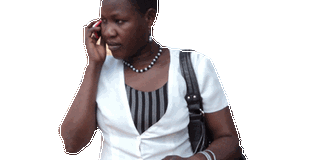Blind but with a vision

Fazira Kawuma, an LC V Councillor in Jinja District, lost her sight in her second year at the Uganda College of Commerce, Torooro.
What you need to know:
It is often said that attitude is everything. The story of Fazira, a young woman who became blind in her adulthood, will only serve to reinforce that saying.
It is good to have a positive attitude and to consider everyone around you as equally positive. You also need to be bold. These are principles by which Fazira Kawuma has written her life, scoring several successes.
But all has not been a bed of roses, however, especially the events following her eye impairment. “At one time I even thought of taking my life,” she narrated.
She is the last child in a family of nine, the Nyende family from Iganga. Originally the family lived in Buwaabe, Nsaale Parish in Ibulanku Sub-county where she studied Primary 1 and 2 at Nakibumbe Primary school.
Then, the family migrated to Wante village in Mayuge district where she completed primary school at Mbale Church of Uganda Primary School.
She grew up with a stepmother, having lost her biological mother at two months. “But I have no regrets, she loved me. She always referred to me as Nankwete (something to always handle with care). Actually after Primary seven, she did not want me to join boarding school but my brothers insisted,” she recalls.
“[My father] always said he had invested in the education of his elder children and whoever succeeded had to assist the one following them.”
“So, my big brother, Musatafa Nyende, currently Bugiri District’s Chief Finance Officer took over because Mzee (father) was retired and no longer earning,” Kawuma explained.
She first went to Wairaka College but moved to Kawempe Muslim Secondary School in Senior two. She again moved to Hassan Tourabi Education Centre Bweyogerere in 2000 where she finished her O-Level and also sat Senior six exams there.
Sight problem
“When I completed my A-Level, actually before I left Kawempe Muslim, I started getting problems with my sight but it only intensified when I moved to Hassan Tourabi. I started having a blurred vision. But I managed to sit and pass my exams. I enrolled in Uganda College of Commerce Tororo for a diploma in business studies. I had always wanted to be an accountant,” she says.
“I completed my first year but toward the end of second year the condition became worse. I always had to be assisted by friends and I never told them about my problem. I was negative about myself. I imagined myself as a young beautiful girl that could not see.
One time I knocked a course mate and he almost fell. I remember him saying, ‘this girl seems like she is blind.’ I was angry,” narrates Kavuma.
In another incident she knocked a signpost as she was returning from a match where the college had participated.
She visited various eye clinics in vain. “I could no longer read. But I still could not tell my friends. My father was very suspicious about my condition and approached many witchdoctors, but without success.”
After first year she fell out of college, owing to the sight problem. Life became meaningless and she was disillusionmed.
She sat at home for one and a half years until she was identified by Esther Kyozira, the current chairperson of the National Council for Disability.
“She tried to counsel me but I put up a lot of resistance. She told me ‘You can learn Braille and I want to see you at University again,’” Kawuma recalls. “I always looked at her counsel as a dream never to be realised.”
In the meantime, she did some teaching at a school in Maganjo, Kampala. She could teach and write on the board but could not mark, a task that her friend always took on. “I never told my pupils that I was blind,” she fondly explains as she recalls how the pupils liked her.
At last, Kyozira picked her and took her to Kireka rehabilitation centre where the organisation she headed had organised a hi-tech computer training project.
She trained in JAWS (job access with speech), a Braille programme. Before the training ended, she was encouraged to apply at Kyambogo University in the Community Based Rehabilitation Department, which she did and got admitted to the Faculty of Special Needs and Rehabilitation.
But even then, there were challenges. It was at the centre in Kireka where she thought of taking her life. “It was a struggle to even feed myself. Later Sight Savers International paid the remaining half of my tuition because my counsellor had told me to look for sponsorship.”
When she took her certificate to her brother Nyende, he was excited and when she told him her suicide story he simply told her that “that was stupidity.”
She singlehandedly went to the Faculty of Special Needs and Rehabilitation, Kyambogo University and started studying, without paying a single shilling. It was after I had started that my brother started paying the tuition and other things.
“In my course I was the only blind student. At first, this affected me so much but because the lecturers were supportive, they always made sure I was on board. But there were also some Tanzanian colleagues who always sympathised with me and always encouraged me. It was I who now had low self-esteem but slowly my self-esteem went up.”
She ventured in campus politics. Initially she thought of competing as a faculty representative for the disabled students but later decided to go mainstream. She stood for Hall representative against someone who was not disabled.
“I won and I became a GRC representative for the entire Hall not for disabled students only,” Kavuma remembers with pride.
Her participation in guild politics was a big launching pad. By the end of her course, the National Union of Disabled Persons of Uganda (Nudipu) and the Uganda National Association of the Blind (Unab) started inviting her for different trainings.
One such Unab training on “Knowledge on democracy and development” brought her in touch with reknown names in the disability movement, notable among them Mr Joseph Walugembe, the development manager for Sense International.
“I remember Walugembe saying, “You look very brilliant and I like the way you present yourself. That’s good packaging.” That statement encouraged me so much.
Walugembe, who was Country Director of Action on Disability at that time, enlisted her on a volunteer scheme for graduate students looking for jobs. At the end of the scheme she was placed with Jinja District Association of the Blind as a volunteer coordinator.
“During the attachment, you have to yield results to convince the organisation. So I worked so hard. Out of the 10 volunteers that were placed, I am the only one who managed to renew my contract for another year,” she recalls.
Competencies that gave her an edge included identifying disabled persons, writing reports, identifying support, counselling disabled persons and linking people with disabilities. Her work as a volunteer connected her to the big shots in the district. With that she tested the political waters and was elected to the Jinja NRM PWD League representing Jinja Municipality. When the general election came she traversed the entire district.
“Voters saw I was the right person, they voted me (to the district’s Local Council V). But I owe it all to the volunteer scheme which exposed me. My impact would not have been felt had it not been for the scheme.”
She also serves as secretary on the Eastern (Uganda) region PWD coordination committee covering 32 districts.
She is looking to two terms as a councillor and will probably move to bigger things. “I am only saying other people should come up. But I might also be eyeing the seat for Jinja woman MP. By the time I leave the council, I will have built the confidence.”
She will not talk much about her social life. “I am not yet married but I am engaged. I won’t tell you the lucky person. If I do and you publish it, Mzee and my brothers will start asking for cocks and kanzus.”




